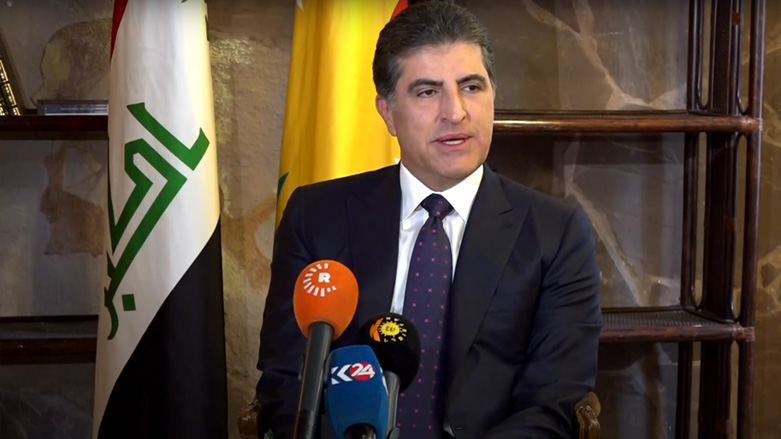Talks on Erbil-Baghdad issues take center stage at MSC meetings, says Kurdish president

ERBIL (Kurdistan 24) – Discussions about Erbil and Baghdad relations were the major topic of the bilateral meetings the Kurdish delegation had with various regional and Western officials on the sidelines of the Munich Security Conference in Germany, according to Kurdistan Region President Nechirvan Barzani.
Barzani’s remarks came during a press conference he held on the sidelines of the 59th MSC on Sunday in the European country, where he briefed the reporters on the matters he discussed during the meetings he had as well as the most pressing issues related to Kurdistan Region, the fight against ISIS, and Kurdish domestic politics.
Erbil-Baghdad relations
In the more than 20 bilateral meetings that the president held over the past three days, the relations and issues between the Kurdistan Regional Government (KRG) and federal government were the “major topics”, Barzani told the reporters.
“The international community intends to help resolve the Kurdistan Region and Baghdad issues,” Barzani said, adding the Kurdish region seeks to end the long-standing disputes per the constitution and according to the agreement it had struck with other parties to form the new government.
He reiterated Erbil’s support for Prime Minister Mohammad Shia’ Al-Sudani’s government.
Barzani met with Al-Sudani on the sidelines of the gathering on Saturday, and they discussed the lingering issues between the two governments.
Europe’s quest for energy amid Russo-Ukrainian war
The almost-one-year war in Ukraine had been the center stage of the high-level discussions at the Bavarian capital, where last year officials barely departed from the country when the invasion of the eastern European country was launched.
Since then, the western European countries have been looking for alternative sources of energy to reduce dependence on Russian gas, whose streaming revenues, the Western capitals think, are fueling the war machine in Ukraine.
“If there is a correct vision, Iraq and Kurdistan Region, as part of the country, could help significantly in this regard,” Barzani said, adding the matter has been discussed during the meetings.
ISIS threats
The ongoing fight against the so-called Islamic State and threats emanating from the terror group were discussed in the meetings.
“We do not think ISIS is over,” Barzani told reporters, saying the international community still perceives ISIS as “a threat”.
“We believe ISIS can still pose a serious threat to Iraq’s stability,” the Kurdish president added.
Barzani said that he had extended his appreciation to the support that the Western countries had thrown behind Kurdistan Region in the fight against ISIS.
He also met with the US Assistant Secretary of Defense for International Security Affairs Dr. Celeste Wallander on the sidelines of the gathering, where they discussed the fight against terrorism.
KDP-PUK tensions
The recent tensions between the Kurdistan Region’s leading parties, the Kurdistan Democratic Party (KDP) and Patriotic Union of Kurdistan (PUK), as well as the Kurdish unity, were underlined in the meetings, according to Barzani.
However, there have been tensions and concerns recently, the president said that he does not think the conflict would not pose a “serious threat” to the Kurdistan Region.
The two parties will meet soon, he announced.
Regarding setting a date for the Kurdistan Region’s sixth parliamentary elections, Barzani will meet with the representatives of the political parties after he returns back to the Kurdish region.
Kurdistan Parliament last year extended its legal term by a year, delaying the election by a year due to political differences.
